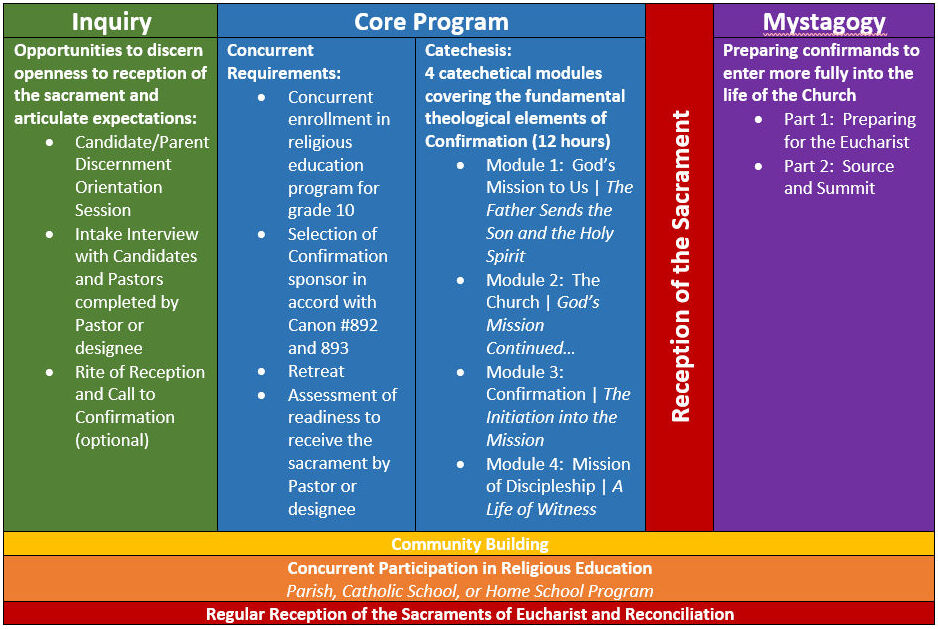Diocesan Guidelines on Preparation & Reception of Confirmation
Diocesan Policy Regarding Age for Confirmation
In order for an adolescent who has received Baptism and the Eucharist to prepare for Confirmation, he or she must be currently enrolled in the at least the tenth grade and be at least 15 years of age. Reception of the Sacrament of Confirmation will occur in the spring of the year in which the candidate has completed the preparation.
- Canon 889
- 1: Every baptized person who is not confirmed, and only such a person, is capable of receiving Confirmation;
- 2: Apart from the danger of death, to receive Confirmation lawfully a person who has the use of reason must be suitably instructed, properly disposed and able to renew the baptismal promises.
- Canon 890
- The faithful are bound to receive this sacrament at the proper time. Parents and pastors of souls, especially parish priests, are to see that the faithful are properly instructed to receive the sacrament and come to it at the opportune time.
- Canon 891
- The Sacrament of Confirmation is to be conferred on the faithful at about the age of discretion [also known as the age of reason (age seven)] unless the Episcopal Conference has decided on a different age, or there is danger of death or, in the judgment of the minister, a grave reason suggests otherwise.
- Complementary Norm for the Bishops of the United States to Canon 891
- Effective July 1, 2002, the National Conference of Catholic Bishops, in accordance with the prescriptions of Canon 891, hereby decrees that the Sacrament of Confirmation in the Latin Rite shall be conferred between the age of discretion and about sixteen years of age, within the limits determined by the diocesan bishop and with regard for the legitimate exceptions given in Canon 891.
Diocesan Policy Regarding Proof of Baptism
An adolescent seeking the Sacrament of Confirmation must present proof of his or her Baptism or Profession of Faith in the Catholic Church. If there are questions, the Diocesan Tribunal should be consulted. The parish of the one who receives Confirmation should record this sacrament in its register, noting the location, celebrant, and date of the sacrament; it should not be recorded in the register of the parish where the sacrament was celebrated (unless the confirmand resides in that parish).
- Canon 842
- A person who has not received Baptism cannot validly be admitted to the other sacraments.
Diocesan Policy for Preparation
- Elements of the Preparation Program: It is necessary that all pastors, catechetical leaders, youth ministers, and catechists follow the prescribed elements of the preparation program. Other requirements should not be invented, nor should mandatory elements be omitted. Examples of additional items that should not be required include, but are not limited to, the following:
- Completion of service hours (e.g., 15 hours of community service)
- Participation in an overnight retreat (a retreat is required, but not an overnight one)
- Fulfillment of additional content as part of the preparation program not included in the Core Curriculum (e.g., Theology of the Body)
- Adolescent Catechesis: Preparation for Confirmation must be separate and distinct from the parish youth ministry or religious education program (catechesis). Four-year, systematic adolescent catechesis should be in place in every parish, based on the Doctrinal Elements of a Curriculum Framework for the Development of Catechetical Materials for Young People of High School Age approved by the United States Conference of Catholic Bishops (November 2007).
- Place of Instruction: All instruction that pertains to preparation for Confirmation should take place through the candidates home parish. Those enrolled in non parish-based religious education (i.e., home school or Catholic school) must prepare for the Sacrament of Confirmation in the program of their home parish.
- Collaboration with Local Parishes: Given increased collaboration among deaneries, parishes are encouraged to work together to facilitate instruction, retreats, and other events related to preparation for Confirmation.
Refer to the Diocesan Policy and Guidelines for Preparation of Baptized Adolescents to Receive the Sacrament of Confirmation on the employee extranet for further information.
Confirmation Curriculum Suggestions
Parishes are free to choose the Confirmation curriculum that fits best for their parish, so long as it fits the 12 hours suggested for Confirmation preparation and covers the 4 catechetical modules listed in the Diocesan Policy and Guidelines for Preparation of Baptized Adolescents to Receive the Sacrament of Confirmation. The diocese developed its own curriculum in 2011 that is available to all parishes on the extranet, called Confirmation Core Curriculum Lesson Plans. In addition, there is a concordance on the extranet that generally tells you which lessons to use from three popular Confirmation curriculums: Purpose (by Life Teen), Chosen (by Ascension Press), and Decision Point (by Dynamic Catholic). If your parish is considering switching to a new Confirmation preparation program or designing your own and you are not sure where to begin, we encourage you to contact us at [email protected]!

